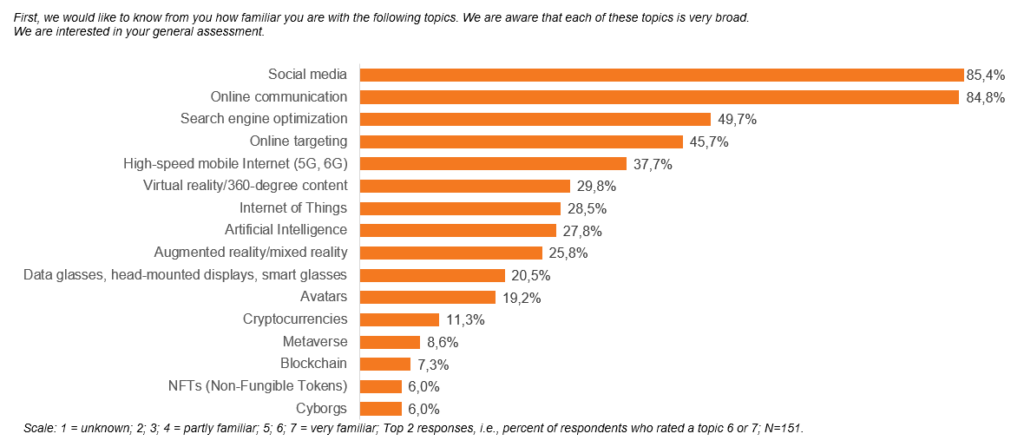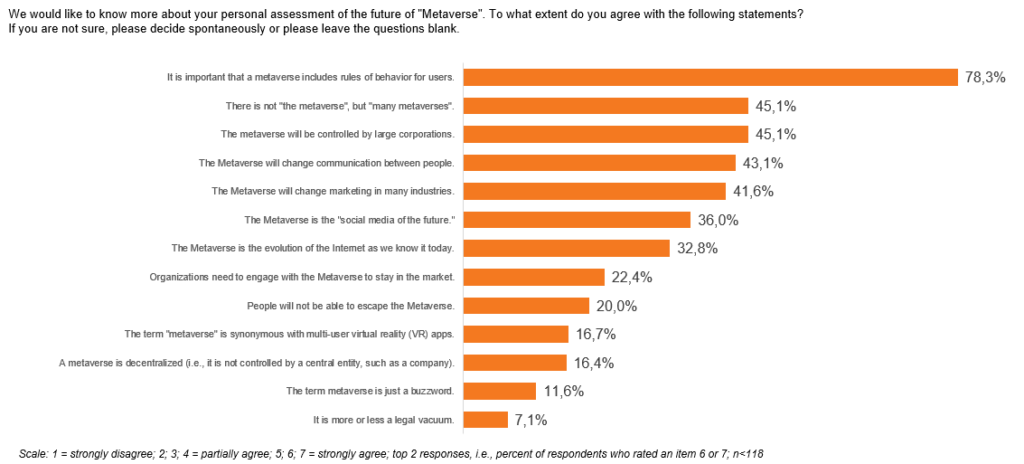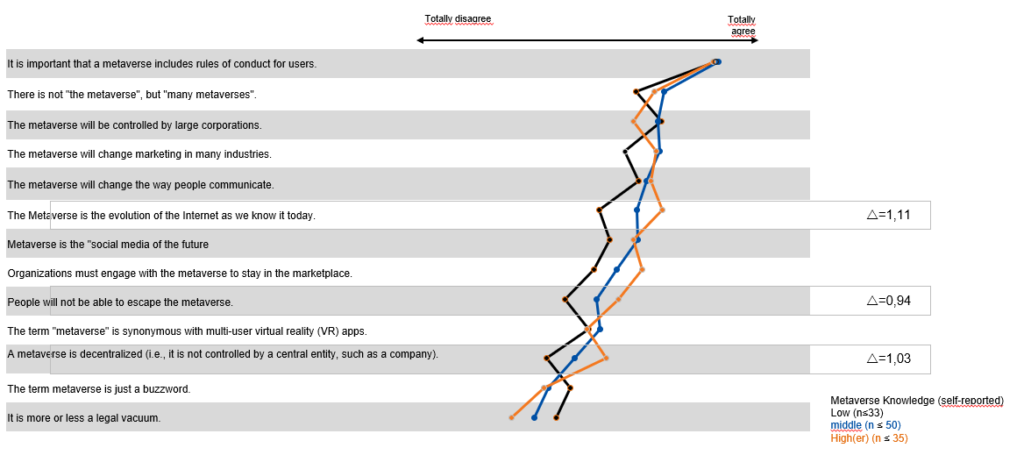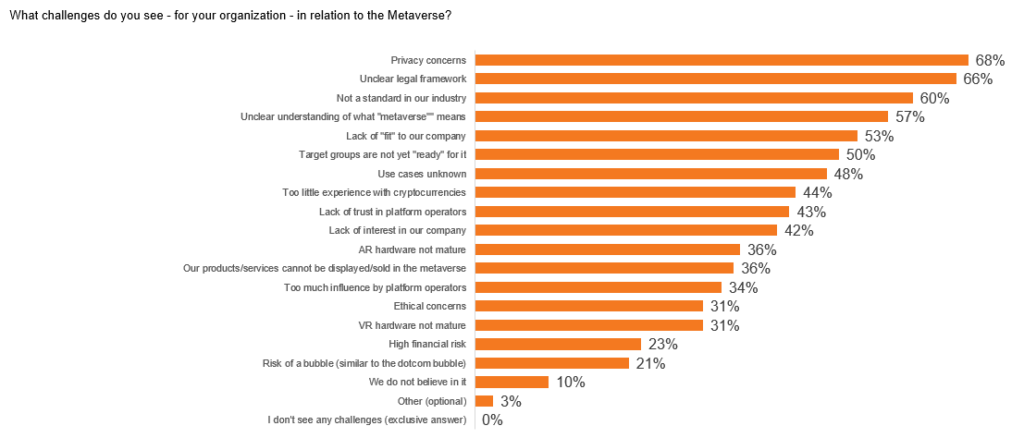Everyone is talking about the Metaverse – at least in our community. But what about the monitorless 3D Internet in practice? We conducted a Metaverse study among German managers. The results are available here.
The study can be downloaded for free and may be used freely if the source is mentioned. The download link is at the bottom of this page.
Metaverse Study
In spring 2022, we surveyed 151 managers from marketing and marketing-related (e.g. PR, innovation) positions. The sample is very heterogeneous in terms of organization types (B2B, B2C, NGO) and size. The survey took place online, as an incentive all participants were offered the results and the participation in a virtual XR/Metavers workshop.
The results are described in detail in the results report (see below). In this post, I summarize selected results.
What is the Metaverse? Definition from the managers’ perspective
We asked the managers we interviewed to define the term metaverse. Of course, this included some people who had never heard the term before. As expected, there was not a lot of feedback from these individuals. The tag cloud below summarizes the results – the more often a term was mentioned, the bigger it is. Colors and arrangement have no meaning.

The tag cloud shows that the terms virtual reality and virtual space are used very frequently. Augmented reality (which is at least as important, if not more so), is rarely mentioned. It is interesting to note that avatars occur proportionately. They are used to make people visible in virtual (or hybrid) environments.
Metaverse compared to other topics
At the beginning of the survey, managers were presented with a list of media, technologies, and practices, some of which are strongly related to the Metaverse idea. Since we assumed already low (but not that low!) experience with this topic, we also mixed more “established” topics among them – e.g. social media, online communication, SEO & co. These values help us to interpret them as a benchmark and should serve to reduce the risk of social desirability and systematic dropouts (e.g. among people who do not know any of the other terms).
Core result of the metaverse study: Hardly any respondent is familiar with the term metaverse – less than 9%. Nevertheless, 78% of the 151 respondents stated a value greater than 1 and thus know the term at least roughly from “hearsay”. For XR – i.e. augmented and virtual reality – the values are significantly higher (26% and 30% respectively), but – compared to social media – still very low. As explained earlier in this article, XR is the gateway to the metaverse and thus an extremely relevant interface technology. NFTs, i.e., non-fungible tokens, and the associated blockchain technology are significantly lower at 6% and 7%, respectively.

Awareness of Metaverse Platforms
Strictly speaking, “the metaverse” does not yet exist. Nevertheless, the term is often used in everyday speech by several brands. Based on research, we identified platforms or brands that are mentioned in the context of Metaverse (without pre-selecting based on our understanding). The goal of the Metaverse study was to find out how well-known these brands are. Minecraft, Fortnite, and Second Life are at the top. New platforms like Decentraland, the Sandbox, Super World, Altspace VR or Spatial.io have significantly lower scores.
Disruption and Metaverse
We presented some statements about the Metaverse and asked respondents for agreement. Some of these statements capture the disruptive potential of the Metaverse. As expected, especially these “visionary” criteria did not received very highly levels of agreement. After all, it would be uncommon for managers to rate a development they have little or no knowledge of as disruptive. It is also evident from the tag cloud above that many managers associate the metaverse with “people in VR.” This is reflected in the agreement statement with the rules of conduct (78%).

Due to the low prevalence of the term metaverse, it is worthwhile to look at different subsamples. For this purpose, managers were divided into three groups (low/medium/high) based on their self-assessed knowledge of the term metaverse. This is not entirely unproblematic in view of the sample size, but can certainly be regarded as a tendency statement. Here, however, there are clear differences between the groups – particularly in the statements “The metaverse is the further development of the Internet as we know it today,” “The metaverse is decentralized […]” and “It will not be possible to escape the metaverse.” These statements suggest that managers who have already dealt (more intensively) with the metaverse also evaluate it as more “disruptively.”

Metaverse study: Managers see these challenges
The surveyed managers were presented with a list of possible challenges. They were asked to select all those that applied from their point of view. Interestingly, even with little knowledge on the subject of Metaverse, privacy concerns are immediately expressed. This fits very well with a recent talk (here on YouTube/in German) by my valued colleague Stefan Koos (law professor) on legal issues of augmented reality and the relationships between law enforcement and inhibition of innovation. Also surprising is that this privacy concern is even above the unclear understanding of the “metaverse”.
Personally, I think it’s a bit of a pity that ethical concerns are so far down this list. At least with my background knowledge in this area, I see huge problems coming our way here (e.g. through Mirrror Worlds, selling NFTs to sensitive target groups like children, FOMO, etc..).
Almost half of the respondents say that their target groups are not yet ready.
We deliberately did not include the central challenge – in order to avoid uncertainty among the respondents: A (or the) ” true” metaverse does not yet exist. We see with Sandbox, Horizon Worlds, Spatial.io etc. many approaches that are more or less close to the idea of a Metaverse. But they are not yet. At least if we follow the definitions of the “metaverse fathers”; recommended here are the two contributions by Mark Billinghurst und Matthew Balls). Due to the inflationary use of the metaverse term for almost every VR application, we may have to get used to a new definition (“XR 2.0”). Unfortunately.

Conclusion: Metaverse is not (yet) a topic in most marketing departments
The topic of Metaverse hasn’t really arrived outside the “bubble” yet. Only recently, we surveyed a large number of consumers. There, less than 10% knew the term. It doesn’t seem to be fundamentally different for managers.
In the everyday life of most of the managers surveyed, the topic of metaverse does not yet play a very important role. On the one hand, this is surprising, since the topic is frequently picked up even by major daily newspapers – not to mention the specialized media. On the other hand, it is not surprising because many metaverse-relevant developments are still in their infancy: Diffusion rates of VR devices are still low, AR glasses still futuristic (enterprise being an exception). Cryptocurrencies are also not yet established. So there are definitely enough other topics that have a higher current relevance. Nevertheless, I am convinced that the relevance will increase in the foreseeable future. Probably very quickly, so that many companies will then miss the jump. Kind of like what we saw with social media marketing in the early 2010s. So, reason enough to take these study results as motivation to deal with it NOW and not when everyone is doing it.
Download the study report
You can download the study using this link
DOWNLOAD (GERMAN; English version will follow)
Of course, you may freely use the content from this document for private and commercial purposes, provided that the source is properly acknowledged. I would be happy if you give me feedback on how you did this. However, please respect copyright/trademark laws.
Please do not link the PDF or put copies on other websites, but link to this bog article. This will also ensure that your readers always have access to the most current version.
Recommended citation:
Rauschnabel, Philipp A. (2022). Metaverse Marketing 2022. results of a manager survey; Universität der Bundeswehr München; online: unibw.de / https://philipprauschnabel.com/transferforschung/metaverse-studie-deutschland/ (retrieval date: YYYY/MM/DD).
Brand logos/screenshots: Rights belong to the respective brand owners; they are shown here for illustrative purposes only.
All surveys have certain limitations that should be kept in mind when reading them. 151 responses are at least acceptable for reasonably “stable” results (many other studies are well below this). However, this number is too low for subgroup analyses. It can be assumed that people who are not/barely familiar with the metaverse term dropped out of the survey disproportionately often. This means that their assessment is underrepresented and the results may therefore be somewhat “overoptimistic”.